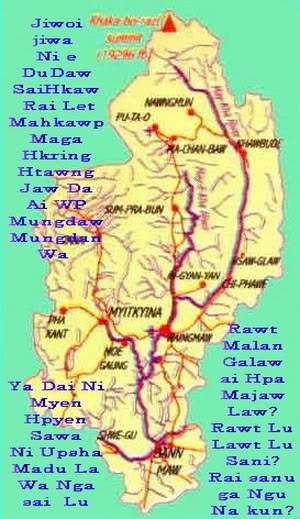KIO Wants Hong Kong Status
Some of Burma's armed ethnic groups are seeking the support of the Chinese government in a bid to gain self-autonomy in their regions, a leading think tank disclosed on Tuesday.
The International Crisis Group (ICG) said that the Kachin Independence Organization (KIO) has had “basic discussions” with Beijing over the contours of a “genuine union” within Burma in which the ethnic groups would have autonomy, possibly similar to the Special Administrative Regions in China—Hong Kong and Macao.
“The Kachin are working on a common peace proposal for which they plan to seek Beijing’s backing,” according to the ICG's 20-page report released on Tuesday titled “China's Myanmar Strategy: Elections, Ethnic Politics and Economics.”
Both KIO and United Wa State Army (UWSA), the two major cease-fire groups along the Sino-Burmese border, have refused to accept the the Burmese regime's border guard force (BGF) plan, raising the specter of war in the region.
Based on sources in China and Burma, the ICG report described Chinese pressure and mediation between the Burmese regime and the two armed groups as the key factor in ensuring that tensions did not boil over even after the regime's deadline for the groups to accept the BGF expired in April.
Clarifying the report with The Irrawaddy, Stephanie T. Kleine-Ahlbrandt, China's adviser for the ICG, said that ethnic groups, including the KIO, have expressed to Chinese officials their desire for some kind of functional autonomy without independence or self-determination, proposing a region that stays within the Union of Burma but that has considerable control over its own political and economic affairs.
“The Wa group has the same idea, though it does not use the same terminology,” she said.
The ICG report quoted ethnic group officials and Chinese analysts as agreeing that the most likely trigger of war between the regime and the ethnic groups was unlikely to be a full-scale military offensive but rather a misfire or skirmish that could trigger a wider conflict.
“China's preferred solution to the long-term standoff between Naypyidaw and many of the country’s ethnic groups is gradual policy adjustment by a strong central government,” it said, noting the view of many ethnic groups that any premature agreement with the regime is not likely to bring peace and stability anytime soon.
Following the return of Burmese strongman Snr-Gen Than Shwe from a visit to China last month, the Burmese state-controlled media has said that China will not support any group opposing the Naypyidaw. However, Chinese official reports only stressed the bilateral understanding on maintaining border stability.
One of the key points in the report was China's wariness of the US administration’s new engagement policy with Burma—a policy which Beijing sees as a potential challenge to its influence in Burma and part of a US strategic encirclement of China. The consequence, it said, was Beijing to increase its political and economic presence to solidify its position in Burma.
Kleine-Ahlbrandt said that although China is increasing its investments in other countries in the region, similar high-level diplomatic traffic between China and Burma was not seen in other countries in the region, referring to the visits of three members of China's Politburo who have visited Burma since March 2009.
Sep 23, 2010
Subscribe to:
Post Comments (Atom)
WUNPAWNG MUNGDAN SHANGLAWT HPUNG A NINGGAWN MUNGMASA
WUNPAWNG MUNGDAN SHANGLAWT HPUNG A NINGGAWN MUNGMASA
CHYE JU KABA SAI
Sa Du N'Gun Jaw La ai Majaw N'chying wa Chyeju Dum Ga ai,Yawng a Ntsa Wa Karai Kasang Kaw na N'Htum N'Wai ai Shaman Chye ju Tut e Hkam La Lu Nga mu Ga law







No comments:
Post a Comment